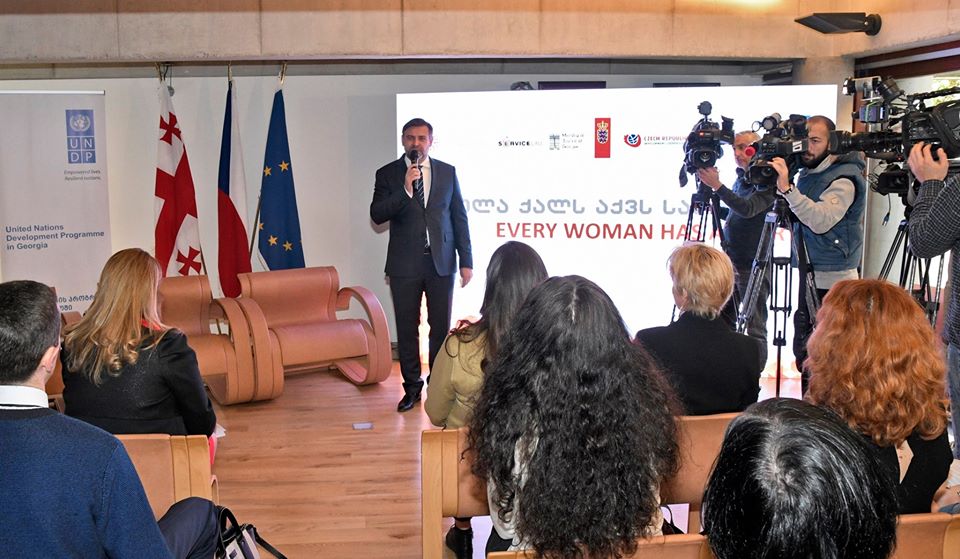Every Woman Has A Story: A Study on Violence & Bystanders
The Embassy of the Czech Republic in Georgia hosted an event ‘Every Woman Has a Story,’ dedicated to the results of the new research conducted by the UNDP in partnership with the UN Women and the Embassy.
The research presentation was a part of the larger UN undertaking, a broad campaign titled “16 Days of Activism” running from November 25th through December 10th and focused on near-ubiquitous violence against women. In the opening remarks, HE Ambassador of the Czech Republic to Georgia, Petr Mikyska, addressed the troubling statistics. “One in seven women in Georgia reported having experienced domestic violence in their lifetime. This research presents some answers on what can trigger bystanders to take action, what may be stopping them from intervention and how they can help gender-based violence survivors,” he said.
Funded by the Czech and Danish governments and conducted jointly by two UN agencies, UNDP and UN Women, in partnership with the UK’s Behavioural Insights Team and the Public Service Development Agency at the Ministry of Justice of Georgia, the research covered the capital, Tbilisi, and two rural regions, Kakheti and Guria. The selection of the research area was determined not just by the geographic East-West spread, but by the statistics on reported cases of domestic violence across Georgia: the highest in Kakheti, and the lowest, in Guria. Jumping ahead, we need to mention that, strangely enough, this made no difference in the engagement rate of the bystanders: 11.5% in Kakheti and 11% in Guria. In both instances, the numbers are shockingly low, and UNDP Head Louisa Vinton is right to express her concerns that this attitude is costing lives.
“The research confirms our assumption that a large share of the public still views domestic violence as a private ‘family matter,’ rather than a crime that merits police intervention,” she said. Indeed, with the places where such violence occurs identified as predominantly family abodes, many of the 400 responders felt that “it wasn’t their place” to interfere.
The goal of the study was to gauge the range of responses of witnesses to the instances of domestic violence, and to dissect them further, in order to understand why some chose to remain mere bystanders while others actively engaged and spared no effort in trying to assist victims.

Somewhat counterintuitively, females were responding to instances of domestic violence more actively than males, indicating that it was “the right thing to do”, the research shows. Very few feared for their safety; moreover, the rate of engagement was higher when the respondent was the only witness to the incident – probably, feeling more of a personal responsibility for the victim’s well-being, as opposed to a somewhat diluted one, in a collective setting.
The socio-demographic profile of those who tend to engage the most mirrors the Georgian equivalents of “wokeness”: educationally, a Master’s degree; financially, a monthly income of 3,000 GEL or more (for comparison, average salaries hover around 500-700); a self-identified lack of formal religious affiliation, as in church-going. Not surprisingly, the highest level of witnesses who refuse to be passive bystanders is observed in the capital, at almost 45%.
The panelists, representing both academia (ISET, GIPA, CRRC, IliaUni) and agencies (MIA, ATIP Fund), along with the UNDP and ServiceLab staff, spoke of the community engagement that tends to be predominantly female, shaping up the informal network of support. They emphasized the need to use the existing framework and build upon it to ensure the higher engagement with the victims themselves, who often refuse to cooperate with the police called to the scene.
Overall, the findings are sure to provide a wealth of opportunities to improve the current state of affairs, to all the actors, both state and civic organizations. The Ministry of Internal Affairs, despite making considerable progress in approaching domestic violence issues, could take heed from the statistics showing respondents taking on the abusers themselves, choosing to confront them and citing “not knowing what else to do.” Field workers have provided a feedback that shows police officers less versed in communicating all the available options and recourses to the victims than one would hope, after all the trainings and educational effort in this direction.
As the UNDP Head Louisa Vinton indicated, this study is a part of the continued cooperation effort that is not limited to a research, but has overarching impact in policy-making support. The panelists echoed her positive outlook, noting the state agencies’ openness to have academia actively participate in shaping policies regarding domestic violence.
By Kyra Devdariani










